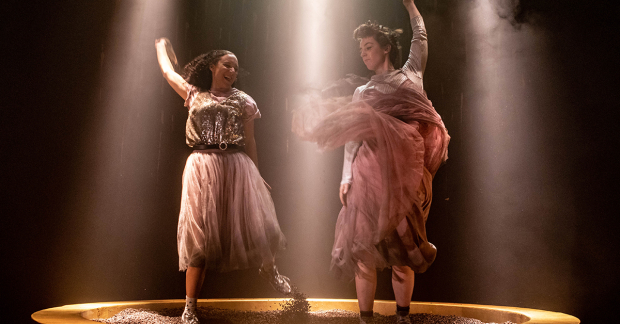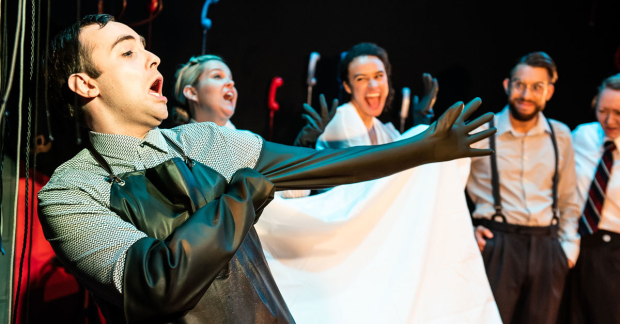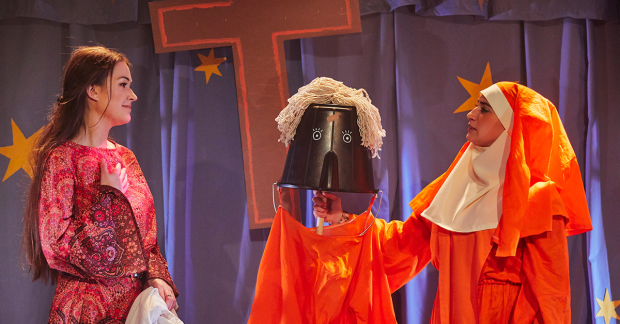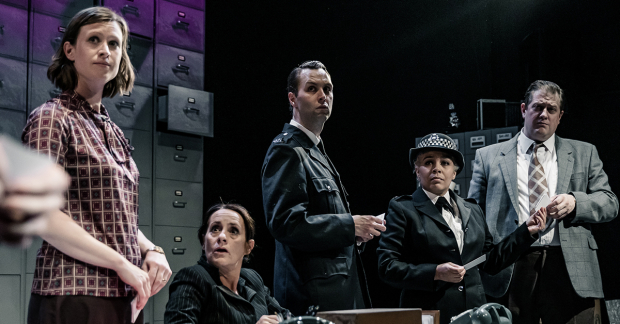Review: Antigone (New Diorama Theatre)

© Ali Wright
Many know the story of Antigone, in which King Creon's niece demands a respectable burial for her brother Polynices, who has been labelled a traitor to his country.
In this all-female reinvention of a haunting classic, writer Lulu Raczka places the focus on the two sisters, Antigone and her younger sister Ismene. Shut away in their Uncle Creon's house with their two brothers off at war, the teenage girls are left to forge their own realities to avoid confronting the very real possibility that their brothers may die. Of course, the shame surrounding their family – they are the daughters of an incestual relationship and hated by those around them– also plays a factor in their refusal to leave the safety of their home.
The set design rightly takes its inspiration from the idea of burial and ritual. A large, circular wooden receptacle is filled with soil. The two sisters lie half-buried and the play begins with their emerging from the dirt. Director Ali Pidsley opens the first five minutes of the play without any dialogue, whilst still cleverly showcasing the tender relationship between the sisters. We see that Ismene follows her sister where she goes, whilst Antigone is bolder and her wish for ritual stronger. It's an effecting opening. We then burst into a hilariously unexpected dance party featuring Destiny Child's "I'm a Survivor" breaking us out from the solemnity and introducing one of the sisters' favourite fantasies — heading to a bar.
However, after this, the play does take a while for it to draw us in. The sisters speak of the men outside their Uncle Creon's house, dreaming about going to a bar. Antigone (Annabel Baldwin) pressures her younger sister to lose her virginity, whilst Ismene (Rachel Hosker) repeatedly questions her sister about the particulars of sex. This section goes on for a long time, and whilst it does set up the intertwining themes of sex and death that run throughout the Theban plays, it is less captivating than the rest of the performance.
This production asks us to think about the often blurred lines between 'good' and 'bad' people, as well as what is wrong and what is right. A war rages outside Creon's house, but the war this story focuses on is the war within it. Ismene cannot understand why Antigone is so determined to bury Polynices, because 'he doesn't deserve it'. When Antigone leaves to commit the illegal act, it's a visually powerful moment that shows you the gravitas of her decision. Antigone dashes to the side of the stage, yanking the pulley holding up the lighting rig (Tim Kelly). The now slanted lights flicker dangerously, and suddenly our perspective is shifted from one concentrated within the house to one unfamiliar and strange. Kieran Lucas' sound design tells a story – such as when the onstage action freezes and all we hear is the sound of an army marching followed by several seconds of excruciating scraping and shovelling. It allows us to imagine the hard, gruesome work of burying a loved one in the earth.
Raczka's writing is rich. The actors multi-role as a barman, as Eurydices, as Haemon, and there is even a long monologue towards the end which shifts (but doesn't break) the show's rhythm. When the sisters learn of their brothers' deaths, their grief and panic is so overwhelming that they can't pause to think for a moment. In a flurry of overlapping dialogue, they share with us their fears, hopes and, for Ismene, her secret guilt.
Many actors speak of trying to match up to a text and do it justice, but this performance felt like a rare instance of the actors not only just meeting the text and performing it beautifully, but almost surpassing it. Baldwin is so convincing in her portrayal of the impetuously devout Antigone, and Hosker as the cautious loving sister, that I wished for more silence towards the end. These are the moments in which the grief sits heavier and the audience perhaps needs more time and less dialogue to fully digest.
This is a smart, intimate piece that shows us the power of conviction, and the eternal love between two sisters.















